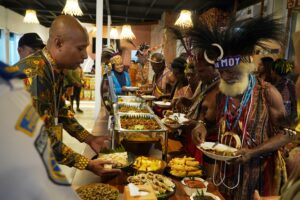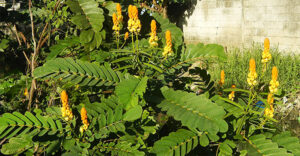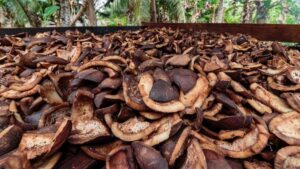
Tuesday, 27 October 2020, at 08.00, Cakalele dance gave a pleasant welcome to our arrival at Samo Village, West Halmahera. It was at a remote coastline in Halmahera. The villagers welcame us with rigid health protocol. The ship anchored 700 meters away from Samo Village. We visited here for three days to be with the local residents celebrating their success in building food resilience and forest protection. There were 3 Villages welcame our visit, Samo, Posi-posi and Gumira. These villages got supports from EcoNusa and PakaTiva North Maluku in the past 2 years. The support will revive the community resilience in food and forest protection.
Formerly, a logging company operated nearby these villages that took away precious timbers for high costs. The forests actually are the treasure of Samo, Posi-posi and Gumira Villages. Halmahera forests have been cut off since 1980s. Large and costly timbers were sacrificed. But it was not go along with better welfare of the dwellers. The residents lives and dwellings have remained modest. Transportation infrastructure remains the major problems for the villagers to market their agriculture and fishery products. The major local commodities are copra, nutmeg, clove and fish.
Read also: Restoring Food Independence of Communities in Coastal Halmahera
During the pandemic outbreak with total closure of transportation, the community felt the gratitude as they had been back to farming a year before. As to the local residents, they planted rice around 25 years ago. The incessant government rice subsidies at the time made them live in comfort. When the cheap rice subsidy stopped, they regularly started to afford rice from outside.
Last year, PakaTiva North Maluku with EcoNusa support started to support back farming on the field. The seed was taken from East Halmahera. In early 2020, the community has harvested around 2.5 tons of paddy from their own cultivation. During the pandemic, the community does not worry due to the sufficient stock of food. In addition, the community also consume sago and cassava. All food potentials are well maintained and developed to build food resilience among the community.
We saw the enthusiastic villagers in some activities in Samo, Posi-posi and Gumira. The initiatives of the three villages inspired some other neighboring villages to start the same initiative. Each village has their own plot for seeding and piloting to help ease the villagers who are interested in farming. The plots serve as the seeding centers in which everyone from the village or neighboring village could take them. As a result, the residents now suffice their vegetables that they used to afford from outside.
For three days, we also socialized health care related to Covid-19 prevention and held healthcare consultation and free medical check for the community. There is no Community Health Center in these villages. There is only one midwife at each village. Besides, we also provide masks to the locals and taught the midwife how to use Covid-19 rapid test for early detection to curb Covid-19 transmission.
Editor: Leo Wahyudi







